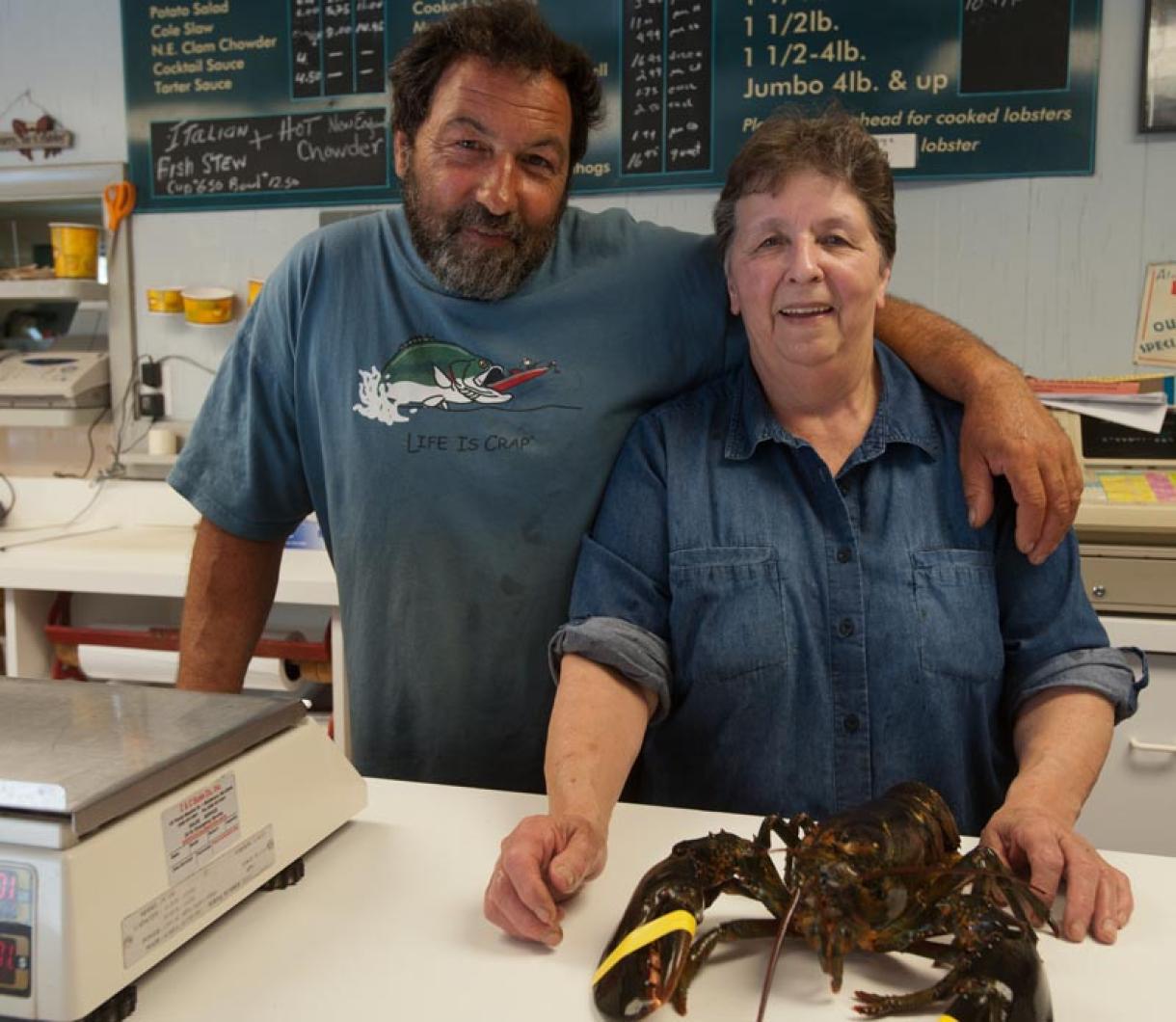Atlantic bonito are here. After rumblings over the last two weeks, reports are coming in that the summer’s fastest swimmers have entered Island waters. We’ve heard that Atlantic bonito, which usually reside in warmer waters, have been taken at The Hooter, a buoy that marks Muskeget Channel.
Capt. Porky Francis of Edgartown said he also is hearing reports that bonito are being taken at Hedge Fence, a shoal that is off Oak Bluffs.
If the folks at NASA had come up with a rocket that moves through space as fast as an Atlantic Bonito moves through water, we’d have landed men on Mars already. Bonito are streamlined. They are similar in design to a bullet-fast tuna, but not as big. It is a perfect fish for the grill, tasty and not too fishy.
“If I could get my hands on them I’d be selling them in the store,” said Sandra Healy of John’s Fish Market on State Road in Tisbury. Ms. Healy instead has plenty of locally-caught bluefish, fluke and striped bass.
But as for the bonito, talk to any captain and not only is the word out, the recipes are starting to surface.
Evan Jones of Larry’s Tackle Shop said that he first heard of bonito two weeks ago, when there were reports of them being caught around Noman’s Land. “Last week, we heard there were four reports east of East Beach [Chappaquiddick]. The fish is expected to be in these waters into the fall.
“The water is 74 degrees out there,” Mr. Jones said. That summer warmth that seems to be attracting bonito is working against striped bass. Striped bass prefer colder water. Mr. Jones said the attention has shifted to bluefish and bonito.
We heard that one local angler caught a cobia, a fish more often associated with warm southern water. We were unable to reach the fisherman, but a number of people saw the fish. Cobia are a dark colored fish with a jaw that is uniquely different from most local fish. Sometimes people mistake a cobia for a shark. The fish is common in the 20- to 50-pound range.
Capt. John Potter of the 71-year-old party fishing boat The Skipper is still spending most of his time out on the water, not steering the boat but unhooking black sea bass for his clients. He said they’ve been getting plenty of these big fish. He has been taking his 40-foot boat out off Oak Bluffs and having a time. This is his 25th season taking fishermen of all ages out on the water.
Sharks and Lobsters
The 26th annual Monster Shark Tournament takes place this weekend in Oak Bluffs. The contest runs from yesterday through tomorrow. Anglers gather along the Oak Bluffs waterfront. The weigh-in takes place at the usual spot, in the afternoon, next to Our Market. Organizers portray their contest as the largest offshore sport fishing event in New England.
Amid a wave of reports of dropping prices for lobster coming from the north, the local fish markets have had to take a time out with their customers to explain that the drop in price isn’t being felt here. On Tuesday, the Boston Globe ran a front-page story citing an over-abundance of lobsters flooding the market.
The price isn’t being felt here for a couple of reasons. Number one, we are told, is that the market is being flooded by softshell lobster meat. Nearly all the lobster sold on the Vineyard is hardshell lobster, a premier lobster. Sandra Healy at John’s Fish Market said she gets her lobsters from the cold waters of Canada. There is a premium price for that, along with the transportation.
The fact is, hard shell lobster from cold water tastes better.
“There is more meat in a hardshell lobster and they are tastier,” said Jeffrey Maida of The Net Result market in Vineyard Haven.
Lobsters go through their seasonal changes. They go through a shelling period, a time when they get rid of their old shell and try on a new one. When they shed is determined by the season and the water temperature. Warm-water lobsters are shedding.
Mrs. Healy said she buys her lobsters from Canada because it is a higher quality product, with more choices and more certainty.
It is also widely known that Southern New England lobsters are in a bad state. They have been labeled overfished and environmentally stressed by warming water temperature.
The price for lobster sold in the store may vary; but it is essentially $9 a pound for any lobster under a pound and a half. $10 for lobsters that are a pound and a half to a pound and three quarters.
Grace Church hosts a lobster roll party every Friday afternoon during the summer. Lorraine Clark, who oversees the popular source for fresh lobster rolls said the $15 price for a lobster roll isn’t changing. Like the markets, Mrs. Clark said they get hard-shell lobster meat from Canada. To her, it is a tastier meat. Last year the church sold 18,000 lobster rolls and could do as well this summer, their 25th anniversary year. A 24-pound case of frozen lobster meat costs over $500, she said. And they go through lots of cases.
“This is the first year we have gone to hardshell lobsters. In the past we’ve done softshell,” Mrs. Clark said. “Part of the decision is taste. It is a sweeter lobster meat,” Mrs. Clark said.
The Church sells the lobsters from 4:30 to 7:30 on Friday afternoon, and is on Woodlawn Avenue and William street, a block away from Main street.
The Tautaug Picture
It seems as though we are hearing that more and more anglers are catching tautaug. Tautaug was once one of the most common recreational and commercial fish caught in these waters. There are old Vineyard Gazette articles that refer to the abundance of this fish here.
Tautaug have for a long time been in decline, and maybe there is new evidence that the fish is starting to come out of a slump. Recreational fishermen are allowed three fish per day. The minimum size is 16 inches. The commercial season for tautaug is closed, so don’t expect to buy a locally-caught tautaug in the store.
Evan Jones caught tautaug from off the Menemsha Jetty two weeks ago. He gave the fish to his mother, Jeanne Staples of Edgartown, a local artist.
“The fish were caught during the day,” Mr. Jones said. “I cooked some in a pan with salt, pepper. When I cook, I keep it simple. I don’t want to mask the flavor of the fish. You don’t want to overpower the flavor of the fish.” Tautaug is a good eating fish.
Ms. Staples has her own recipe. Rub generous amounts of olive oil around the fillet. Then put black cherry-infused Balsamic vinegar on it. She gets it from LeRoux. Then salt and pepper it a little.
“Then lightly sprinkle white or brown sugar on it,” she said, “just a touch. Let it sit for half an hour. Grease up your grill and throw it on. That little bit of sugar will put a nice brown glaze on the fish. It gives it that little extra je ne sais quoi,” she said.
Global Overfishing
Giulio Pontecorvo, 89, an Aquinnah summer resident, has published a study on global overfishing and its consequences. The study, “The expansion, limit and decline of global marine fish catch” will appear in the September print issue of Marine Policy, published by Elsevier, a global publisher headquartered in Amsterdam. It is already online. Mr. Pontecorvo is a professor emeritus at the graduate school of business at Columbia University. He shares the authorship with William E. Schrank of Memorial University of Newfoundland, Canada.
Mr. Pontecorvo said this week he is concerned for the future, not just for the fish, but the planet. There has been plenty of attention about the effects of global warming, growing population and changes in the economies of the world, but little about the impact that fewer fish will have on the ocean and, for that matter, the world. Mr. Pontecorvo reported that fish stocks worldwide began to decline in 1996 and it continues to decline at a time when the population is growing.
Using data from a number of statistical sources, including FishStat, a database of worldwide fish landings, Mr. Pontecorvo reports: “Fisheries, as part of the human food chain, are among a set of global environmental problems (water, food, climate) that require, on a planet organized into nation states, international cooperation and compromise that often run counter to perceived national interests.”
The population of the world is growing and their need for sustenance will continue to grow. “I think fish are illustrative of the problems we have with depleting the world resources,” he said.
For example, Mr. Potnecorvo said that: Newfoundland cod is so depleted that there has been a commercial harvest moratorium on the fish going back to 1992. Cod was once an important and dominant fish in that part of the Atlantic. Local fishermen are now pursuing what the cod used to eat and having some success at it. Mr. Pontecorvo said fishermen are now harvesting shrimp and crabs and making more money than they did catching cod. He wonders what the long-term impact will be. What does it mean to no longer have cod in that part of the ocean? “These relationships are complicated. You don’t know what the longer-term impact is going to be,” he said.
Even more broadly, Mr. Pontecorvo said these changing relationships “may be part of the climate change.”
Mr. Pontecorvo hopes his article will move the discussion forward to protect the earth and its changing resources.
He has been summering on the Vineyard since he and his wife Margaret built their house in Aquinnah in 1970.







Comments
Comment policy »